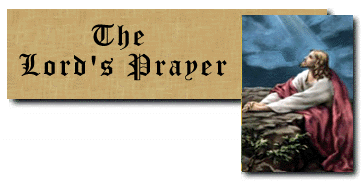|
Main Page
|
|
The main page contains links to general and featured articles, as well as the survey, icon collection, and other new and coming features.
|
|
History
|
|
The articles in the History section cover a wide range of ecclesiastical history, both in terms of time period and topic. They are arranged in a rough chronological order.
|
|
Theology
|
|
As far as the theology section goes, at the moment, the articles follow no rational order, and so it's something of a free-for-all. But go, read, enjoy.
|
|
|

|

|

[history page]
Here is a brief outline of the evolution of the Lord's Prayer in English. I think it's pretty interesting.
A.D. 1258 -- Fadir our in heuene, haleeweide beota thi neume, cuman thi kinderiche, thi wille beoth idon in heune and in erthe. The euerych dawe bried gif ous thilk dawe. And worzif ure dettes as vi vorsifen ure dettoures. And lene ous nought into temptation. Bette delvvor of unval.
|
A.D. 1300 -- Fadir our in hevene, Halwewyd by thi name, thi kingdom come. Thy wille be done as in hevene in erthe. Oure urche days bred give us today. And forgive us our detes, as we forgive our detoures. And lede us not into temptation. Bote delyvere us of yvel.
|
A.D. 1582 -- Our Father which art in heaven, sanctified by thy name. Let thy kingdom come. Thy wil be done as in heaven and earth also. Give us this day our super substantial bread. And led us not into temptation. But deliver us from evil.
|
A.D. 1611 -- Our Father which is in heaven, hallowed be thy name. Thy kingdom come. Thy will be done, in earth as it is in heaven. Biue us this day our dayly bread. And forgive our debtors. And leade us not into temptation, but deliver from evil. For thine is the kingdome, and the power and the glory for ever.
|
A.D. 1789 -- Our Father who art in heaven, hallowed be thy name. Thy kingdom come. Thy will be done, on earth as it is in heaven. Give us this day our daily bread. And forgive us our trespasses, as we forgive those who trespass against us. And lead us not into temptation, but deliver us from evil. For thine is the Kingdom and the Power and the Glory, forever and ever. Amen.
|
A.D. 1970 -- Our Father in heaven, hallowed be your name. Your kingdom come. Your will be done, on earth as it is in heaven. Give us this day our daily bread. And forgive us our sins, as we forgive those who sin against us. Save us from the time of trial, and deliver us from the Evil. For the Kingdom, Power and the Glory, are yours now and forever. Amen.
|
The 1789 version is from the 1789 Book of Common Prayer of the Episcopal Church. It differs slightly from the KJV, which has "Our Father which," rather than "Our Father who." Presbyterians and some other Protestant groups continue to use "debts" and "debtors" -- also more in keeping with the KJV -- in place of "trespasses" and "those who trespass against us," respectively. Roman Catholics omit "For thine is the kingdom and the power and the glory, forever and ever," which Luke's gospel also omits.
The 1970 version was developed by the International Consolation on English Texts, a world wide representative body of scholars from Roman, Anglican, Lutheran, Presbyterian and Methodist communions. It can be found in the newest (1976) version of the Book of Common Prayer.
The New Revised Standard Version (NRSV), which is based on more accurate manuscripts than the KJV, shows that the original manuscripts of Matthew and Luke differ from those used in determining the Lord's Prayer in worship services. As well, if you follow such groups as the Jesus Seminar, then you know that very little, if any, of the Lord's prayer can be traced back to the historical Jesus himself.
|
"Pray then in this way: Our Father in heaven, hallowed be your name. Your kingdom come. Your will be done, on earth as it is in heaven. Give us this day our daily bread. And forgive us our debts, as we also have forgiven our debtors. And do not bring us to the time of trial, but rescue us from the evil one.
(Matt. 6:9-13, NRSV)
|
He said to them, "When you pray, say: Father, hallowed be your name. Your kingdom come. Give us each day our daily bread. And forgive us our sins, for we ourselves forgive everyone indebted to us. And do not bring us to the time of trial."
(Luke 11:2-5, NRSV)
|
[history page]
|
|